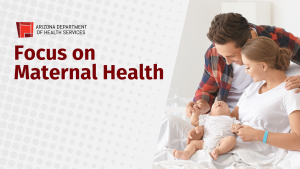
Supporting the physical and mental health of new and expectant mothers
 Maternal health is a key priority at ADHS. During the week when we mark Maternal Health Awareness Day, I’m highlighting two recent initiatives aimed at improving the health of pregnant women, postpartum women, and newborns.
Maternal health is a key priority at ADHS. During the week when we mark Maternal Health Awareness Day, I’m highlighting two recent initiatives aimed at improving the health of pregnant women, postpartum women, and newborns.
One is a recent report summarizing data on maternal mortality related to mental health conditions and substance use disorder. It found that almost half of all pregnancy-associated deaths between 2016 and 2018 were related to mental health conditions or substance use disorder. Of these deaths, nearly all were preventable. The report also found that women from tribal nations experience the greatest disparity in pregnancy-associated deaths related to mental health conditions or substance use disorder.
This effort shines additional light on the continuing challenge of maternal mortality and other complications that arise during and after pregnancy. On average, between 70 and 80 women in Arizona die each year within 365 days of pregnancy, and most of these are due to preventable conditions. Even in less severe situations, at least one in seven women in the United States will experience a maternal mental health condition such as perinatal depression, anxiety, and/or psychosis.
Another recent report draws on the perspectives of women in the months before and after giving birth to develop recommendations for improving maternal health in Arizona. This supplementary study, conducted through a partnership with the University of Arizona’s Mel and Enid Zuckerman College of Public Health, is a follow-up to the 2021 Title V Statewide Maternal and Child Health Needs Assessment. It focuses on perinatal care, information services, and specialist care. It also recommends changes in services, resources, and policies that can improve maternal health outcomes.
Informed by detailed interviews with participants, here are some of the study’s recommendations when it comes to services and resources:
- In rural areas, which tend to have a limited number of doctors, alternative options such as midwives, doulas, and nurse practitioners can help address a gap in available services and reduce the need for women to travel long distances to access care.
- Pregnant women and new mothers benefit from more personal, empathetic, and culturally appropriate care.
- Increased access to pregnancy classes, breastfeeding support, postpartum checkups, and other support services can enhance maternal health.
ADHS is committed to educating patients and health care providers about the causes and contributing factors of maternal morbidity and mortality and to empowering women to report pregnancy-related medical issues. Increasing our understanding of these conditions benefits efforts to achieve health equity, reduce stigma, and bolster support for new and expectant mothers.
Please visit azhealth.gov/BWCH to learn about resources and programs offered by our Bureau of Women’s and Children’s Health. For new and expectant mothers, these include: Count the Kicks, which educates expectant parents about the importance of tracking fetal movement daily in the third trimester of pregnancy; Hear Her, which helps women identify and report maternal warning signs; Know the Signs, which provides information on recognizing the signs of a possible maternal mental health condition and where to seek support; and Hope Heals, which has information and help for mothers struggling with substance use disorder.
Resources are available for parents, loved ones, and providers. There is support available, Know the Signs. Call or text the National Maternal Mental Health Hotline at 1-833-9-HELP4MOMS.

